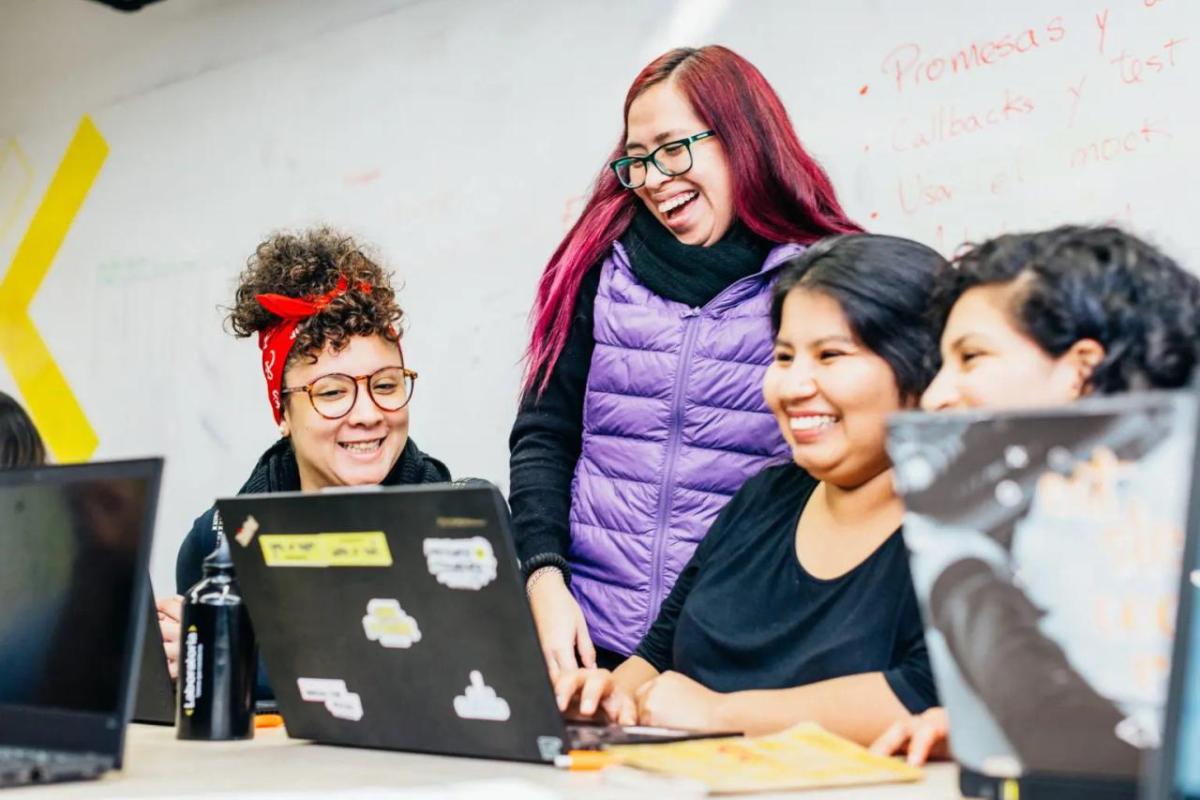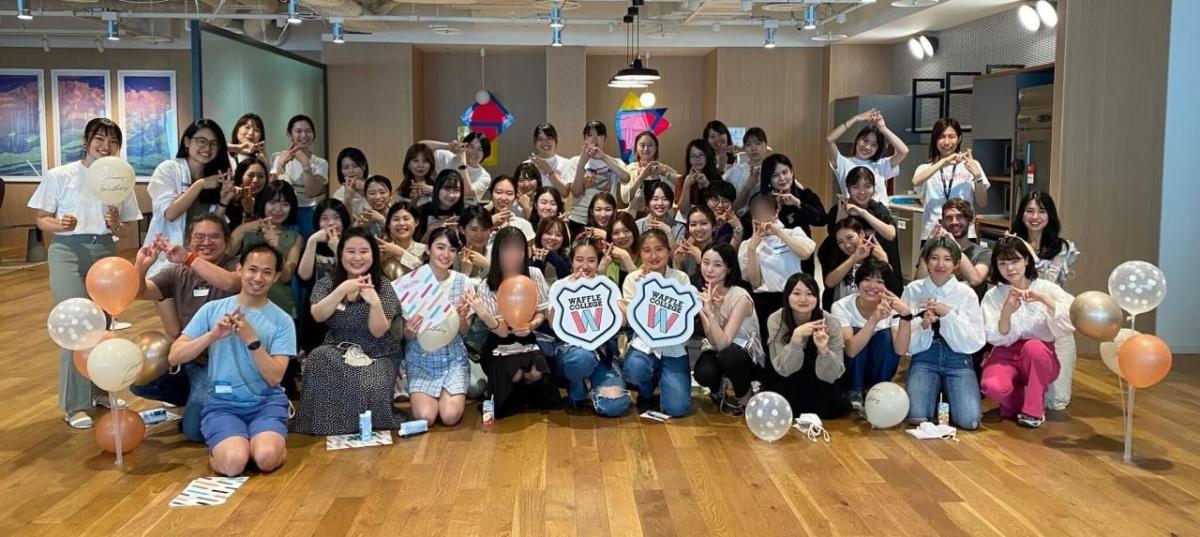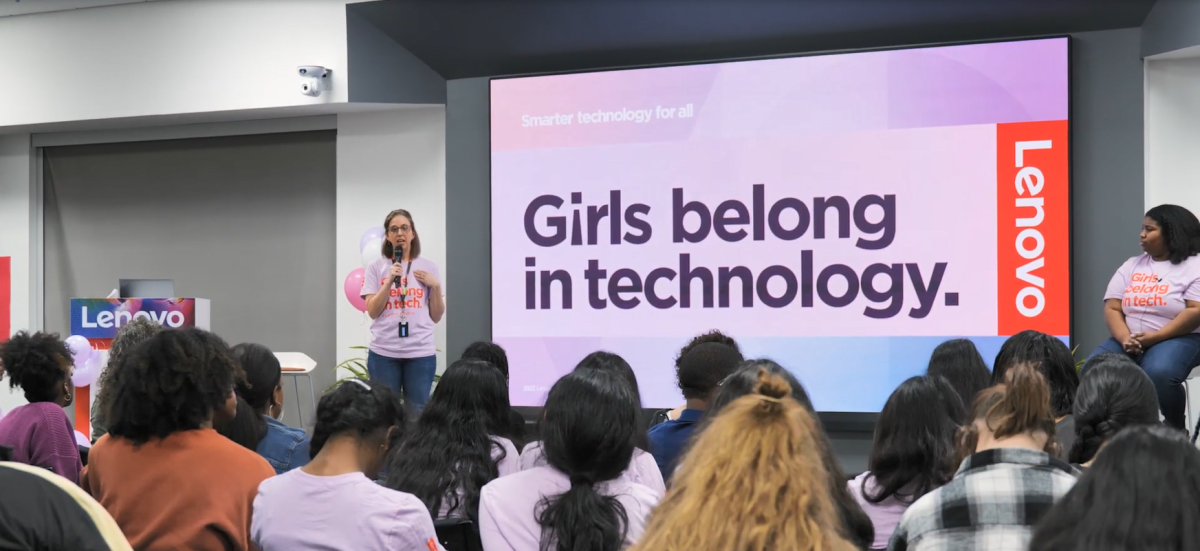Equity in Tech: How To Increase Gender Diversity Across the Talent Pipeline
Lenovo supports and recently hosted a youth-led initiative to encourage girls to pursue careers in technology called ‘Girls Belong in Tech’ in its Morrisville, North Carolina U.S. offices.
As a signatory of the United Nations Women’s Empowerment Principles and a global technology company, Lenovo is committed to advancing gender equality in the workplace, marketplace, and community. As a global technology company, Lenovo has a strong role to play in advancing women in STEM. On International Women’s Day, we’re taking inspiration from our community partners around the world to understand how they help women around the world embrace equity and overcome the challenges of access to a career in STEM.
The roots of the STEM gender bias begin in early education. According to UNICEF’s report on Mapping Gender Equality in STEM from School to Work, trends in gender bias in STEM can be seen as early as primary (elementary) school. While initial factors of a girl’s proficiency in STEM can be contingent on where she is born and the socioeconomic status of her family, common barriers and STEM gender biases can be seen in the most developed countries for girls with higher socioeconomic status. Below, we pull out key boundaries found in UNICEF’s report, with strategies and advice from Lenovo partners and programs around the world to overcome them.
1. Provide more access to STEM resources for educators.
With the motto, ‘technology has no gender,’ Aj Ty v IT is focused on building a gender equal technology sector. The organization’s efforts are focused in Slovakia, which is also home to Lenovo’s largest European office. While Aj Ty v IT offers a wealth of resources across the STEM pipeline, they’ve recently launched a new program specifically focused on helping educators encourage more girls in STEM. The TECHLIB project allows Aj Ty v IT to be present in schools, giving teachers access to technology so that they can attract more girls into tech by showing their own acquired skills and tech literacy.
Cooperation with Lenovo Bratislava WILL team is a great experience. Petra Hajdukova (Lenovo employee leader) and the rest of organizational team are very helpful and engaged. Most important is that we share common understanding about how important it is to connect professionals and students and create opportunities for students to succeed in their future careers. – Matúš Masica, Project Manager, Aj Ty v IT
2. Check for gender representation in STEM curriculum.
“You can’t be what you can’t see,” is a saying that resonates with even the most pioneering champions of change. It represents the need for organizations to ensure that their own curriculum and visuals are providing balanced representation of women and men. While gender representation across materials may seem like a straightforward fix, many organizations go above and beyond by creating curriculum specifically for girls and women. In Australia/New Zealand, Code Like a Girl has created their own ‘School of Code’, with courses designed to appeal to women, but grounded in inclusion for all. “For our tech to be for all of us, it must be built by all of us. Code Like a Girl exists to empower women and girls to have a role in developing that future. By removing barriers to education, we can ensure a more equitable tomorrow and more inclusive workplaces.” Ally Watson OAM. Founder & CEO, Code Like a Girl
3. Bridging the lack of role models
While there’s been a rise in recognition for women paving the way for female leadership in tech, role models that are accessible and approachable for most young girls can be harder to find. Laboratoria has made mentorship and role models a key part of its mission to empower women who dream of a better future to start and grow transformative careers in technology. Lenovo volunteers – men and women – have served as career mentors and role models through the partnership, helping to encourage the future of female STEM talent on their journey with the understanding that better mentorship leads to better program outcomes.
“The lack of female role models in tech is a significant barrier for women seeking to start a career in this industry, and also affects the sense of belonging and professional growth for those women who are already in the tech sector. At Laboratoria, we are grateful to the Lenovo volunteers who have helped address this gap and we are proud to see the way our graduates are becoming role models for other women and girls, and supporting each other’s growth as future leaders of the tech sector.” – Karen Kelly, Director of Regional Partnerships, Laboratoria
4. Overcoming general gender stereotypes
Waffle Japan has designed curriculum and programs to attract and keep girls in technology from middle and high school through college. Guided by the mission to ‘unlock women’s potential and make an impact in the world together with them’, their solutions have been designed with their home country’s specific challenges in mind (Female students’ ICT career aspirations in Japan are the lowest of all 63 OECD countries). Waffle recognizes women’s need for varying levels of support across their journey to a STEM career. Their pipeline begins with programs built to attract middle and high school girls to tech through software application development contests. From there, girls are able to take part in multi-week, remote coding camps that teach them software development basics while connecting them to female role models in tech. Finally, Waffle supports women in college by providing training and internships in technology through Waffle College, available to undergraduate and graduate students. Through these programs and personalized support, Waffles co-founders work to overcome stereotypes about women’s belonging or aptitude in technology.
Beyond the partnerships highlighted through examples above, Lenovo remains committed to advancing women in STEM in its own workforce and programs. With its industry-leading 36% overall female representation in its workforce, Lenovo is working to increase representation at the top with a goal to increase female executive representation to 27% by 2025. Outside of its workforce, Lenovo is focused on empowering women in STEM around the world and across the pipeline. Understanding that drastic change happens faster through collaboration, in July 2022 Lenovo was proud to join Micron Foundation and AVPN in a USD $1 million investment to encourage young girls in STEM. Through the leadership of its female employees and with support from Lenovo global philanthropy, Lenovo has fostered partnerships with the community for Lenovo offices around the world. Lenovo has been honored to support the work of two former NAF interns to encourage their peers in STEM. With help from female employees in Lenovo’s Morrisville, North Carolina U.S., Lenovo hosted a day-long event as part of the ‘Girls Belong in Tech’ initiative. The event succeeded in breaking down the barriers for the girls in STEM, providing role models, mentorship, access to technology, all while being inspired by their peers.
For more information about how Lenovo supports women and underrepresented groups in STEM, view our latest grant round announcement, including multiple new partnerships focused on skilling women for STEM careers. Visit LenovoFoundation.com for more information about Lenovo’s global philanthropy or read Lenovo’s latest ESG Report.





